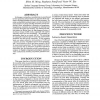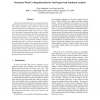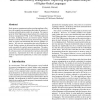4372 search results - page 28 / 875 » Objects for Lexical Analysis |
101
click to vote
NAACL
1994
15 years 4 months ago
1994
In this paper, we describe a reversibleletter-to-sound/soundto-letter generation system based on an approach which combines a rule-based formalism with data-driven techniques. We ...
129
click to vote
ICDM
2008
IEEE
15 years 9 months ago
2008
IEEE
The goal of sentiment prediction is to automatically identify whether a given piece of text expresses positive or negative opinion towards a topic of interest. One can pose sentim...
111
click to vote
PLDI
1995
ACM
15 years 6 months ago
1995
ACM
d Abstract) Alexander Aiken Manuel F¨ahndrich Raph Levieny Computer Science Division University of California, Berkeleyz Static memory managementreplaces runtime garbage collecti...
104
click to vote
LREC
2010
15 years 4 months ago
2010
In this paper, we outline the methodology we adopted to develop a FrameNet for Italian. The main element of novelty with respect to the original FrameNet is represented by the fac...
141
click to vote
ACL
2011
14 years 6 months ago
2011
Unsupervised vector-based approaches to semantics can model rich lexical meanings, but they largely fail to capture sentiment information that is central to many word meanings and...



